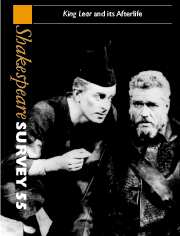Book contents
- Frontmatter
- King Lear: A Retrospect, 1980–2000
- How Shakespeare Knew King Leir
- Contracts of Love and Affection: Lear, Old Age, and Kingship
- Headgear as a Paralinguistic Signifier in King Lear
- What becomes of the broken-hearted: King Lear and the Dissociation of Sensibility
- Lear’s Afterlife
- Songs of Madness: The Lyric Afterlife of Shakespeare’s Poor Tom
- Secularizing King Lear: Shakespeare, Tate, and the Sacred
- ‘Look on her, look’: The Apotheosis of Cordelia
- Jacob Gordin’s Mirele Efros: King Lear as Jewish Mother
- ‘How fine a play was Mrs Lear’: The Case for Gordon Bottomley’s King Lear's Wife
- Some Lears
- King Lear and Endgame
- Shakespeare in Pain: Edward Bond’s Lear and the Ghosts of History
- ‘Think about Shakespeare’: King Lear on Pacific Cliffs
- Actors, Editors, and the Annotation of Shakespearian Playscripts
- Titus Andronicus: The Classical Presence
- Julius Caesar, Machiavelli, and the Uses of History
- Scepticism and Theatre in Macbeth
- Revels End, and the Gentle Body Starts
- ‘Taking just care of the impression’: Editorial Intervention in Shakespeare's Fourth Folio, 1685
- ‘A world elsewhere’: Shakespeare in South Africa
- Shakespeare Performances in England, 2001
- Professional Shakespeare Productions in the British Isles January–December 2000
- The Year's Contributions to Shakespearian Study 1 Critical Studies
- 2 Shakespeare’s Life, Times and Stage
- 3 Editions and Textual Studies (1) and (2)
- Books Received
- Index
Actors, Editors, and the Annotation of Shakespearian Playscripts
Published online by Cambridge University Press: 28 March 2007
- Frontmatter
- King Lear: A Retrospect, 1980–2000
- How Shakespeare Knew King Leir
- Contracts of Love and Affection: Lear, Old Age, and Kingship
- Headgear as a Paralinguistic Signifier in King Lear
- What becomes of the broken-hearted: King Lear and the Dissociation of Sensibility
- Lear’s Afterlife
- Songs of Madness: The Lyric Afterlife of Shakespeare’s Poor Tom
- Secularizing King Lear: Shakespeare, Tate, and the Sacred
- ‘Look on her, look’: The Apotheosis of Cordelia
- Jacob Gordin’s Mirele Efros: King Lear as Jewish Mother
- ‘How fine a play was Mrs Lear’: The Case for Gordon Bottomley’s King Lear's Wife
- Some Lears
- King Lear and Endgame
- Shakespeare in Pain: Edward Bond’s Lear and the Ghosts of History
- ‘Think about Shakespeare’: King Lear on Pacific Cliffs
- Actors, Editors, and the Annotation of Shakespearian Playscripts
- Titus Andronicus: The Classical Presence
- Julius Caesar, Machiavelli, and the Uses of History
- Scepticism and Theatre in Macbeth
- Revels End, and the Gentle Body Starts
- ‘Taking just care of the impression’: Editorial Intervention in Shakespeare's Fourth Folio, 1685
- ‘A world elsewhere’: Shakespeare in South Africa
- Shakespeare Performances in England, 2001
- Professional Shakespeare Productions in the British Isles January–December 2000
- The Year's Contributions to Shakespearian Study 1 Critical Studies
- 2 Shakespeare’s Life, Times and Stage
- 3 Editions and Textual Studies (1) and (2)
- Books Received
- Index
Summary
In recent years, Shakespearian editing - long conducted in a quiet intellectual backwater, undisturbed by larger culture wars - has itself become a key battleground for current theoretical controversy. Debate has, however, tended to focus on the handling of the texts themselves, especially the practices of emendation and modernization, while other key aspects of editorial responsibility have received scant attention. The work of annotation, in particular, remains effectively unscrutinized.
This selectivity of vision has left undisturbed the traditional assumption that the rationale and aims of Shakespearian annotation are self-evident and therefore easily defined - so easily, in fact, that no one need devote energy to defining, or debating, them in print. R. A. Foakes has noted, with regret, the complete absence of 'guides to making a commentary on a Shakespeare play', a situation rendered more disturbing, since 'in editions like those in the Arden series the commentary, which is on the same page as the text, may well be the editorial contribution that is most useful and most studied'. Editors themselves generally remain silent about the principles or preferences that shape their style of annotation. Similarly, reviewers of new editions, though they may on an ad hoc basis query this or that piece of annotation, rarely mount a broader challenge to the rationale (or lack of it) discernible in the overall pattern of annotation in a particular edition; and too often they confine their comments to generalities, pausing only to remark that a particular editor's notes are 'judicious' or that another's 'are copious, perhaps sometimes even excessive', but also 'thoughtful and unintimidating'. In neither of the reviews from which those comments are taken is a single illustration offered in support of these judgements.
- Type
- Chapter
- Information
- Shakespeare SurveyAn Annual Survey of Shakespeare Studies and Production, pp. 181 - 198Publisher: Cambridge University PressPrint publication year: 2002
- 3
- Cited by

